fmt::v8::basic_format_parse_context< Char, ErrorHandler > Class Template Reference
#include <core.h>
Inheritance diagram for fmt::v8::basic_format_parse_context< Char, ErrorHandler >:
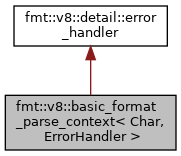
Collaboration diagram for fmt::v8::basic_format_parse_context< Char, ErrorHandler >:
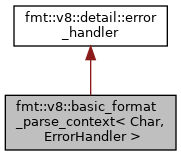
Public Types | |
| using | char_type = Char |
| using | iterator = typename basic_string_view< Char >::iterator |
Public Member Functions | |
| constexpr | basic_format_parse_context (basic_string_view< Char > format_str, ErrorHandler eh={}, int next_arg_id=0) |
| constexpr auto | begin () const -> iterator throw () |
| constexpr auto | end () const -> iterator throw () |
| void | advance_to (iterator it) |
| auto | next_arg_id () -> int |
| void | check_arg_id (int) |
| void | check_arg_id (basic_string_view< Char >) |
| void | on_error (const char *message) |
| constexpr auto | error_handler () const -> ErrorHandler |
Private Attributes | |
| basic_string_view< Char > | format_str_ |
| int | next_arg_id_ |
Additional Inherited Members | |
 Private Member Functions inherited from fmt::v8::detail::error_handler Private Member Functions inherited from fmt::v8::detail::error_handler | |
| constexpr | error_handler ()=default |
| constexpr | error_handler (const error_handler &)=default |
| void | on_error (const char *message) |
Detailed Description
template<typename Char, typename ErrorHandler = detail::error_handler>
class fmt::v8::basic_format_parse_context< Char, ErrorHandler >
\rst Parsing context consisting of a format string range being parsed and an argument counter for automatic indexing. You can use the format_parse_context type alias for char instead. \endrst
Member Typedef Documentation
◆ char_type
template<typename Char , typename ErrorHandler = detail::error_handler>
| using fmt::v8::basic_format_parse_context< Char, ErrorHandler >::char_type = Char |
◆ iterator
template<typename Char , typename ErrorHandler = detail::error_handler>
| using fmt::v8::basic_format_parse_context< Char, ErrorHandler >::iterator = typename basic_string_view<Char>::iterator |
Constructor & Destructor Documentation
◆ basic_format_parse_context()
template<typename Char , typename ErrorHandler = detail::error_handler>
|
inlineexplicitconstexpr |
Member Function Documentation
◆ advance_to()
template<typename Char , typename ErrorHandler = detail::error_handler>
|
inline |
Advances the begin iterator to it.
Here is the caller graph for this function:

◆ begin()
template<typename Char , typename ErrorHandler = detail::error_handler>
|
inlineconstexpr | |||||||||||||
Returns an iterator to the beginning of the format string range being parsed.
Here is the caller graph for this function:
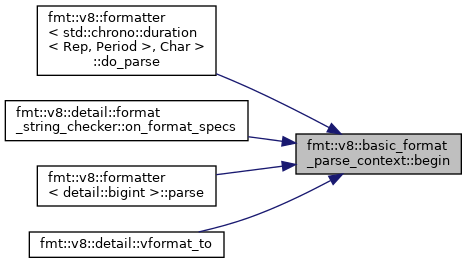
◆ check_arg_id() [1/2]
template<typename Char , typename ErrorHandler = detail::error_handler>
|
inline |
◆ check_arg_id() [2/2]
template<typename Char , typename ErrorHandler = detail::error_handler>
|
inline |
Reports an error if using the automatic argument indexing; otherwise switches to the manual indexing.
Here is the caller graph for this function:
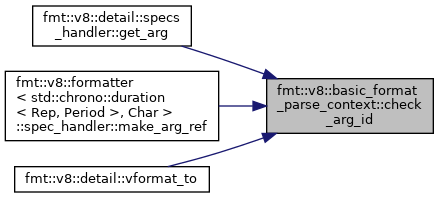
◆ end()
template<typename Char , typename ErrorHandler = detail::error_handler>
|
inlineconstexpr | |||||||||||||
Returns an iterator past the end of the format string range being parsed.
Here is the caller graph for this function:

◆ error_handler()
template<typename Char , typename ErrorHandler = detail::error_handler>
|
inlineconstexpr |
◆ next_arg_id()
template<typename Char , typename ErrorHandler = detail::error_handler>
|
inline |
Reports an error if using the manual argument indexing; otherwise returns the next argument index and switches to the automatic indexing.
Here is the caller graph for this function:
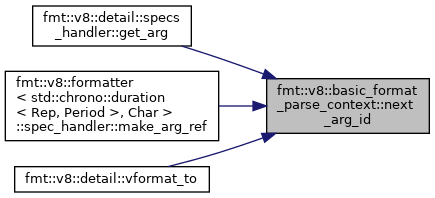
◆ on_error()
template<typename Char , typename ErrorHandler = detail::error_handler>
|
inline |
Here is the caller graph for this function:

Member Data Documentation
◆ format_str_
template<typename Char , typename ErrorHandler = detail::error_handler>
|
private |
◆ next_arg_id_
template<typename Char , typename ErrorHandler = detail::error_handler>
|
private |
The documentation for this class was generated from the following file:
- third_party/spdlog/include/spdlog/fmt/bundled/core.h
